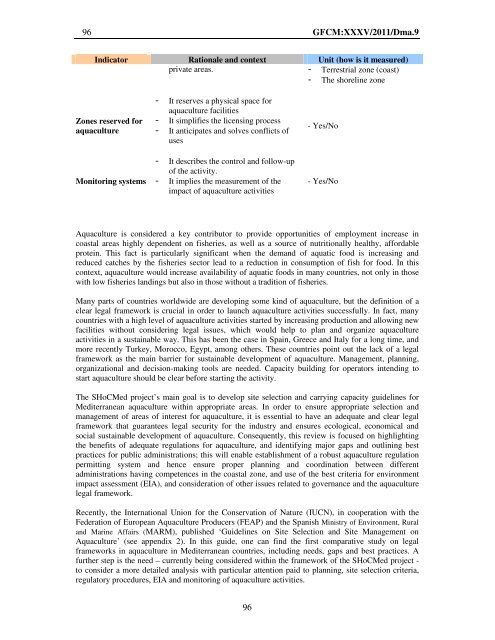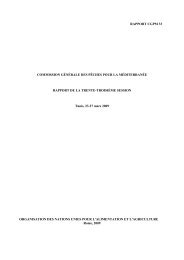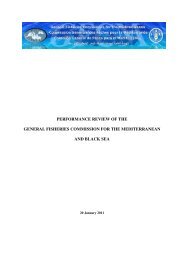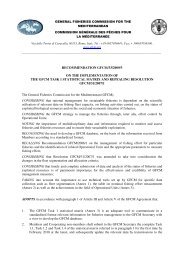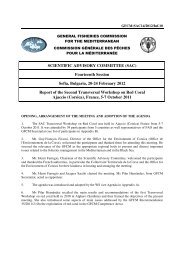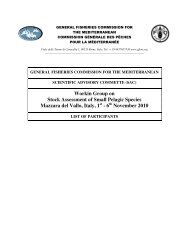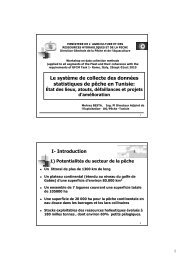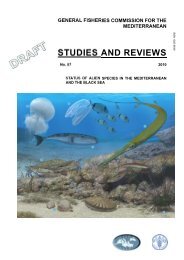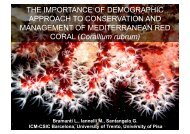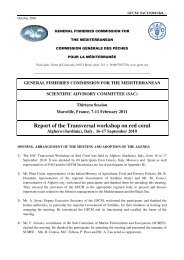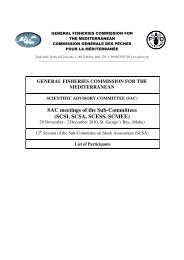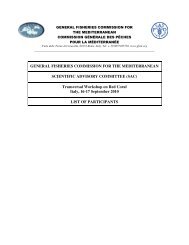Site selection and carrying capacity in Mediterranean ... - FAO Sipam
Site selection and carrying capacity in Mediterranean ... - FAO Sipam
Site selection and carrying capacity in Mediterranean ... - FAO Sipam
You also want an ePaper? Increase the reach of your titles
YUMPU automatically turns print PDFs into web optimized ePapers that Google loves.
96 GFCM:XXXV/2011/Dma.9<br />
Indicator Rationale <strong>and</strong> context Unit (how is it measured)<br />
private areas. - Terrestrial zone (coast)<br />
- The shorel<strong>in</strong>e zone<br />
Zones reserved for<br />
aquaculture<br />
Monitor<strong>in</strong>g systems<br />
- It reserves a physical space for<br />
aquaculture facilities<br />
- It simplifies the licens<strong>in</strong>g process<br />
- It anticipates <strong>and</strong> solves conflicts of<br />
uses<br />
- It describes the control <strong>and</strong> follow-up<br />
of the activity.<br />
- It implies the measurement of the<br />
impact of aquaculture activities<br />
96<br />
- Yes/No<br />
- Yes/No<br />
Aquaculture is considered a key contributor to provide opportunities of employment <strong>in</strong>crease <strong>in</strong><br />
coastal areas highly dependent on fisheries, as well as a source of nutritionally healthy, affordable<br />
prote<strong>in</strong>. This fact is particularly significant when the dem<strong>and</strong> of aquatic food is <strong>in</strong>creas<strong>in</strong>g <strong>and</strong><br />
reduced catches by the fisheries sector lead to a reduction <strong>in</strong> consumption of fish for food. In this<br />
context, aquaculture would <strong>in</strong>crease availability of aquatic foods <strong>in</strong> many countries, not only <strong>in</strong> those<br />
with low fisheries l<strong>and</strong><strong>in</strong>gs but also <strong>in</strong> those without a tradition of fisheries.<br />
Many parts of countries worldwide are develop<strong>in</strong>g some k<strong>in</strong>d of aquaculture, but the def<strong>in</strong>ition of a<br />
clear legal framework is crucial <strong>in</strong> order to launch aquaculture activities successfully. In fact, many<br />
countries with a high level of aquaculture activities started by <strong>in</strong>creas<strong>in</strong>g production <strong>and</strong> allow<strong>in</strong>g new<br />
facilities without consider<strong>in</strong>g legal issues, which would help to plan <strong>and</strong> organize aquaculture<br />
activities <strong>in</strong> a susta<strong>in</strong>able way. This has been the case <strong>in</strong> Spa<strong>in</strong>, Greece <strong>and</strong> Italy for a long time, <strong>and</strong><br />
more recently Turkey, Morocco, Egypt, among others. These countries po<strong>in</strong>t out the lack of a legal<br />
framework as the ma<strong>in</strong> barrier for susta<strong>in</strong>able development of aquaculture. Management, plann<strong>in</strong>g,<br />
organizational <strong>and</strong> decision-mak<strong>in</strong>g tools are needed. Capacity build<strong>in</strong>g for operators <strong>in</strong>tend<strong>in</strong>g to<br />
start aquaculture should be clear before start<strong>in</strong>g the activity.<br />
The SHoCMed project’s ma<strong>in</strong> goal is to develop site <strong>selection</strong> <strong>and</strong> <strong>carry<strong>in</strong>g</strong> <strong>capacity</strong> guidel<strong>in</strong>es for<br />
<strong>Mediterranean</strong> aquaculture with<strong>in</strong> appropriate areas. In order to ensure appropriate <strong>selection</strong> <strong>and</strong><br />
management of areas of <strong>in</strong>terest for aquaculture, it is essential to have an adequate <strong>and</strong> clear legal<br />
framework that guarantees legal security for the <strong>in</strong>dustry <strong>and</strong> ensures ecological, economical <strong>and</strong><br />
social susta<strong>in</strong>able development of aquaculture. Consequently, this review is focused on highlight<strong>in</strong>g<br />
the benefits of adequate regulations for aquaculture, <strong>and</strong> identify<strong>in</strong>g major gaps <strong>and</strong> outl<strong>in</strong><strong>in</strong>g best<br />
practices for public adm<strong>in</strong>istrations; this will enable establishment of a robust aquaculture regulation<br />
permitt<strong>in</strong>g system <strong>and</strong> hence ensure proper plann<strong>in</strong>g <strong>and</strong> coord<strong>in</strong>ation between different<br />
adm<strong>in</strong>istrations hav<strong>in</strong>g competences <strong>in</strong> the coastal zone, <strong>and</strong> use of the best criteria for environment<br />
impact assessment (EIA), <strong>and</strong> consideration of other issues related to governance <strong>and</strong> the aquaculture<br />
legal framework.<br />
Recently, the International Union for the Conservation of Nature (IUCN), <strong>in</strong> cooperation with the<br />
Federation of European Aquaculture Producers (FEAP) <strong>and</strong> the Spanish M<strong>in</strong>istry of Environment, Rural<br />
<strong>and</strong> Mar<strong>in</strong>e Affairs (MARM), published ‘Guidel<strong>in</strong>es on <strong>Site</strong> Selection <strong>and</strong> <strong>Site</strong> Management on<br />
Aquaculture’ (see appendix 2). In this guide, one can f<strong>in</strong>d the first comparative study on legal<br />
frameworks <strong>in</strong> aquaculture <strong>in</strong> <strong>Mediterranean</strong> countries, <strong>in</strong>clud<strong>in</strong>g needs, gaps <strong>and</strong> best practices. A<br />
further step is the need – currently be<strong>in</strong>g considered with<strong>in</strong> the framework of the SHoCMed project -<br />
to consider a more detailed analysis with particular attention paid to plann<strong>in</strong>g, site <strong>selection</strong> criteria,<br />
regulatory procedures, EIA <strong>and</strong> monitor<strong>in</strong>g of aquaculture activities.


